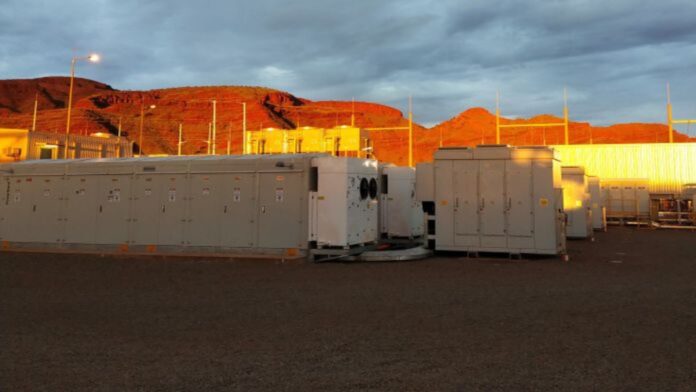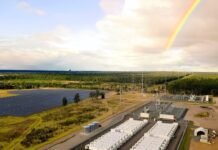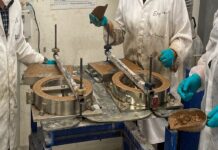
Hybrid Systems Australia has deployed Western Australia’s largest network-integrated battery energy storage system (BESS) as part of Fortescue Metals Group‘s Pilbara Energy Connect (PEC) project.
The PEC project intends to power the miner’s Pilbara iron ore facilities with renewable energy.
One of the largest network-connected BESS ever created for a mining application, 42MW of interconnected battery storage for two Fortescue mine sites was designed, installed, and commissioned by Hybrid Systems Australia, a subsidiary of Pacific Energy.
As part of Fortescue’s PEC project, the batteries, which are now fully operational, have been created alongside solar and new low-emission gas-fueled generating that will be owned and controlled by Fortescue.
According to Pacific Energy, the battery systems employ industry-leading grid stabilising control systems, including millisecond response capabilities and Kokam battery technology, to give stronger protection against load spikes and dips and to preserve overall network stability.
The primary function of the batteries is to provide grid stability and support by providing spinning reserve backup to any gas-generating outages or unexpected fluctuations in solar output.
The batteries will store energy from Fortescue’s proposed 150MW of nearby solar, allowing mining operations to be fueled by more renewable energy and lowering the mines’ annual carbon emissions.
With the planned future growth of Fortescue’s renewable network, Pacific Energy added that the BESS such as these will play a critical role in ensuring network reliability and allowing additional renewables to be added in the future.
Hybrid Systems Australia Executive Director Mike Hall stated that the project was one of the company’s largest and most technologically advanced BESS projects to date and that systems of this size were critical to Fortescue’s goal of eliminating the use of fossil fuels in their operations by 2030.
“Our industry-leading design, network integration experience and strong partnerships meant we could readily deliver a large-scale solution that will allow Fortescue to continue its rapid upscale of renewable capacity and deliver on its real zero target,” Hall said.
Hall added that the BESS are explicitly designed for rural Australia’s challenging circumstances and range in size from 1MW to 200MW, making them ideal for large-scale mining applications where increased dependence on clean energy is desired.
Fortescue Chief Operating Officer Iron Ore Dino Otranto said, “At Fortescue, we are committed to eliminating the use of fossil fuels across our operations by 2030. We were pleased to partner with Hybrid Systems Australia on the battery energy storage systems, which are a significant component of our investment in the Pilbara Energy Connect (PEC) program.”
Otranto stated that the PEC would provide low-cost power to Fortescue’s Iron Bridge operations and support Fortescue’s world-leading decarbonisation drive, allowing for the eventual integration of further large-scale renewable energy into Fortescue’s network.
The PEC’s low-emissions gas-fueled power station is provided by Pacific Energy Pty Ltd., while MVLV Power Solutions designed, created, and installed the switchgear and BESS enclosures, and Digital Intelligence provided the BESS control systems. The project’s success is a testament to Pacific Energy Group’s wide range of internal capabilities.
Hybrid Systems Australia collaborated with Hitachi Energy and Kokam to develop an industry-leading solution for Fortescue by combining expertise and critical battery components from the two specialist equipment suppliers.
Hybrid Systems Australia also partnered closely with Supply Nation recognised vendors, such as electrical contractor Boodjara Pty Ltd and local electrical wholesalers Myelec and D&W Electrical.




















